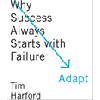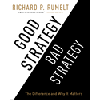Product Description
Katrina. Haiti. BP. Fukushima. The Great Recession. Those are just a few of the catastrophic disruptions the world has endured in recent years. As we try to respond to such crises, key questions arise: What causes one system to break under great stress and another to rebound? How much change can a complex system absorb while still retaining its purpose and function? What characteristics make it adaptive to change?
Through original reporting ranging across disciplines including finance, neuroscience, oceanography, and social psychology, the authors explore how in answering these questions, the new science of resilience can help our institutions become more sustainable, enduring, and humane in the face of cataclysmic events. Provocative and eye-opening, Resilience sheds light on the multifaceted nature of change and gives readers access to cutting-edge tools—developed by the leading thinkers of our time—to help us adapt to an ever-evolving world rather than fall prey to its unpredictability.
Through original reporting ranging across disciplines including finance, neuroscience, oceanography, and social psychology, the authors explore how in answering these questions, the new science of resilience can help our institutions become more sustainable, enduring, and humane in the face of cataclysmic events. Provocative and eye-opening, Resilience sheds light on the multifaceted nature of change and gives readers access to cutting-edge tools—developed by the leading thinkers of our time—to help us adapt to an ever-evolving world rather than fall prey to its unpredictability.
Reviews/Praise
—Publishers Weekly
“Readers will value an analysis that offers stimulating suggestions on how to prepare for the future’s inevitable shocks.”
—Booklist
“In an increasingly complex world, we can’t avoid shocks—we can only build better shock absorbers. This is a brilliant exploration of how best to do that, told with compelling examples and stories.”
—Chris Anderson, Editor in Chief of Wired, bestselling author of The Long Tail
“[Helps] us all understand the importance of planning for the future, even when it means giving up some short-term gains.”
—Dan Ariely, James B. Duke Professor of Psychology and Behavioral Economics at Duke University, author of Predictably Irrational
“Smart and sophisticated, this is a landmark work in a new field. If you are part of a system that wants to avoid collapse, read this book.”
—David Eagleman, Neuroscientist, author of Incognito and Why the Net Matters
“Mandatory. . . . Part complexity theory, part psychology, it is a pivotal book for today and a necessity to strategically plan for tomorrow.”
—David Agus, MD, Professor of Medicine and Engineering, University of Southern California, Author of The End of Illness
“A whirlwind tour through an idea whose time has come. I suspect that the concepts in this book will define the next decade.”
—Jad Abumrad, Host and Creator of RadioLab, and 2011 MacArthur Fellow
“Maps new territory for leaders whether they seek to impact business, science, national security or social transformation. . . . A rare and necessary book.”
—Bill Shore, founder and CEO of the anti-hunger organization Share Our Strength
“Provides an understanding of the deep structures that will govern success in the coming century.”
—Bruce Mau, Co-founder and Director, Massive Change Network
Author Bio
You Might Also Enjoy
Adapt |
Good Strategy/Bad Strategy |


